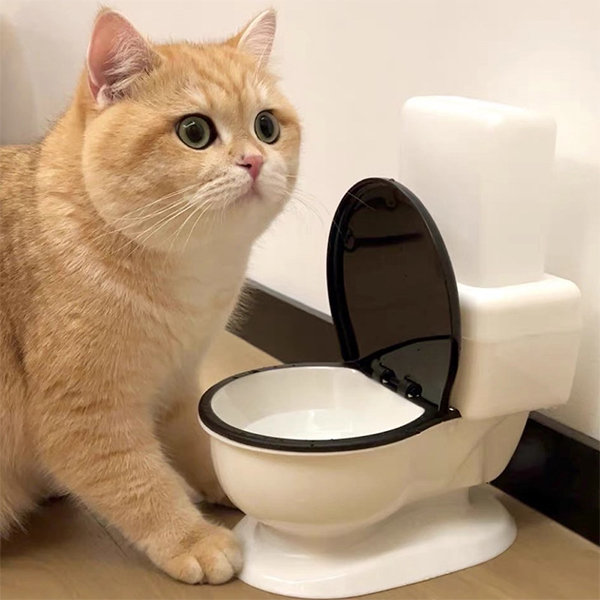Avoid Plumbing Problems: Don't Flush Cat Poop Down Your Toilet - Expert Advice
Avoid Plumbing Problems: Don't Flush Cat Poop Down Your Toilet - Expert Advice
Blog Article
The article listed below pertaining to Don’t flush cat feces down the toilet is unquestionably enlightening. You should check this stuff out.

Intro
As pet cat proprietors, it's vital to be mindful of exactly how we get rid of our feline friends' waste. While it may appear practical to flush feline poop down the toilet, this technique can have destructive consequences for both the environment and human wellness.
Alternatives to Flushing
Thankfully, there are more secure and a lot more responsible methods to deal with pet cat poop. Consider the adhering to alternatives:
1. Scoop and Dispose in Trash
The most typical method of taking care of feline poop is to scoop it right into a biodegradable bag and toss it in the trash. Make sure to make use of a devoted clutter scoop and take care of the waste quickly.
2. Usage Biodegradable Litter
Opt for naturally degradable pet cat trash made from products such as corn or wheat. These clutters are environmentally friendly and can be securely disposed of in the trash.
3. Hide in the Yard
If you have a yard, think about hiding cat waste in an assigned location far from vegetable gardens and water sources. Make certain to dig deep enough to avoid contamination of groundwater.
4. Set Up a Pet Waste Disposal System
Invest in an animal garbage disposal system especially designed for feline waste. These systems utilize enzymes to break down the waste, lowering odor and environmental effect.
Health and wellness Risks
Along with ecological issues, flushing feline waste can additionally posture health risks to humans. Feline feces may consist of Toxoplasma gondii, a bloodsucker that can create toxoplasmosis-- a possibly extreme ailment, particularly for expectant women and individuals with damaged immune systems.
Ecological Impact
Purging cat poop presents hazardous microorganisms and bloodsuckers right into the supply of water, posturing a significant danger to marine ecosystems. These contaminants can negatively influence aquatic life and compromise water high quality.
Verdict
Liable pet ownership expands past providing food and shelter-- it additionally entails proper waste administration. By avoiding purging cat poop down the commode and going with different disposal techniques, we can reduce our environmental footprint and shield human wellness.
Why You Should Never Flush Cat Poop Down the Toilet
A rose by any other name might smell as sweet, but not all poop is created equal. Toilets, and our sewage systems, are designed for human excrement, not animal waste. It might seem like it couldn’t hurt to toss cat feces into the loo, but it’s not a good idea to flush cat poop in the toilet.
First and foremost, assuming your cat uses a litter box, any waste is going to have litter on it. And even the smallest amount of litter can wreak havoc on plumbing.
Over time, small amounts build up, filling up your septic system. Most litter sold today is clumping; it is made from a type of clay that hardens when it gets wet. Ever tried to scrape old clumps from the bottom of a litter box? You know just how cement-hard it can get!
Now imagine just a small clump of that stuck in your pipes. A simple de-clogger like Drano isn’t going to cut it. And that means it’s going to cost you big time to fix it.
Parasitic Contamination
Believe it or not, your healthy kitty may be harboring a nasty parasite. Only cats excrete Toxoplasma in their feces. Yet it rarely causes serious health issues in the cats that are infected. Most people will be fine too if infected. Only pregnant women and people with compromised immune systems are at risk. (If you’ve ever heard how women who are expecting are excused from litter cleaning duty, Toxoplasma is why.)
But other animals may have a problem if infected with the parasite. And human water treatment systems aren’t designed to handle it. As a result, the systems don’t remove the parasite before discharging wastewater into local waterways. Fish, shellfish, and other marine life — otters in particular — are susceptible to toxoplasma. If exposed, most will end up with brain damage and many will die.
Depending on the species of fish, they may end up on someone’s fish hook and, ultimately on someone’s dinner plate. If that someone has a chronic illness, they’re at risk.
Skip the Toilet Training
We know there are folks out there who like to toilet train their cats. And we give them props, it takes a lot of work. But thanks to the toxoplasma, it’s not a good idea.

I discovered that content on How to Dispose of Cat Poop and Litter Without Plastic Bags when doing a lookup on the internet. For those who appreciated our page kindly make sure you remember to share it. Many thanks for taking the time to read it.
Call Today Report this page